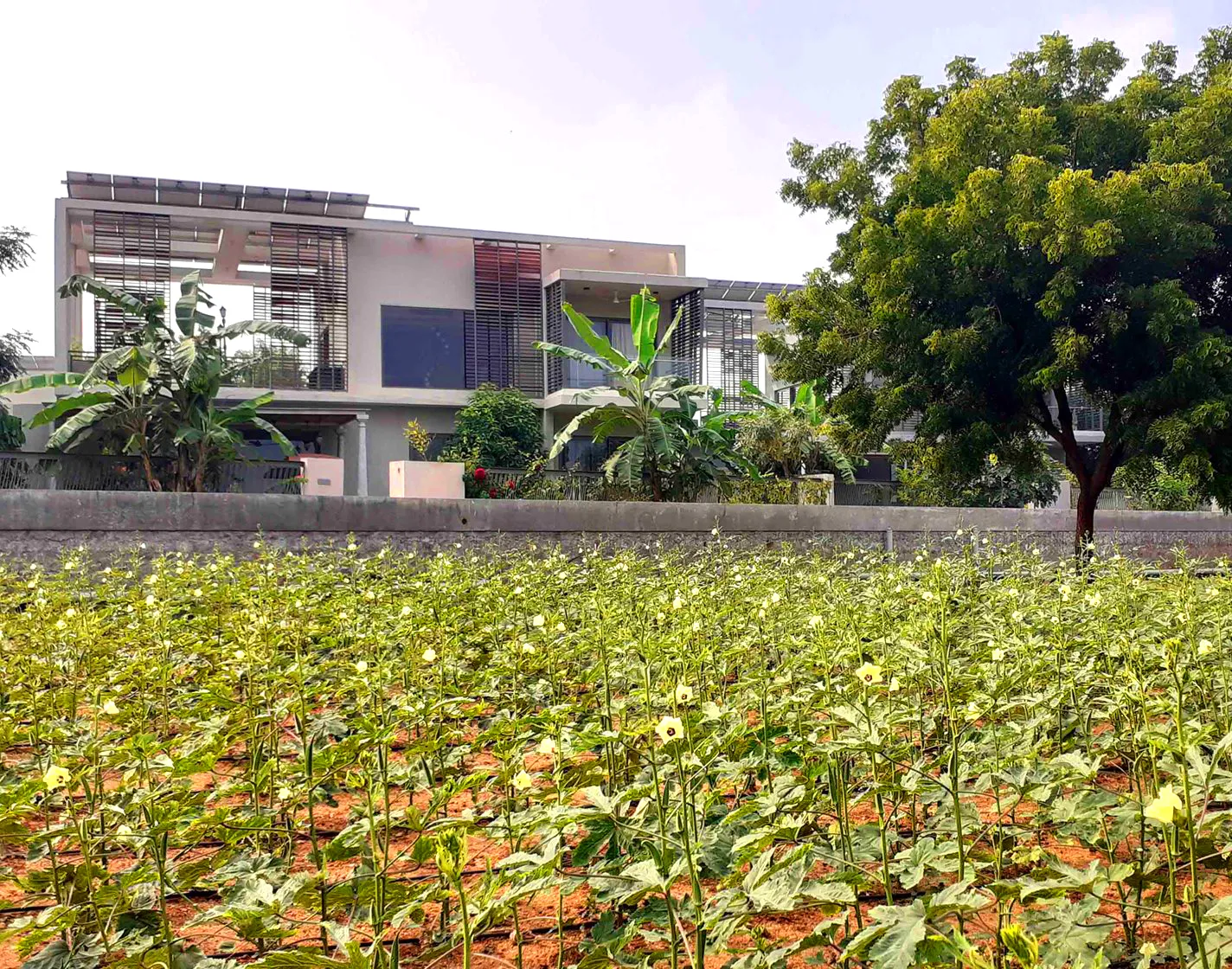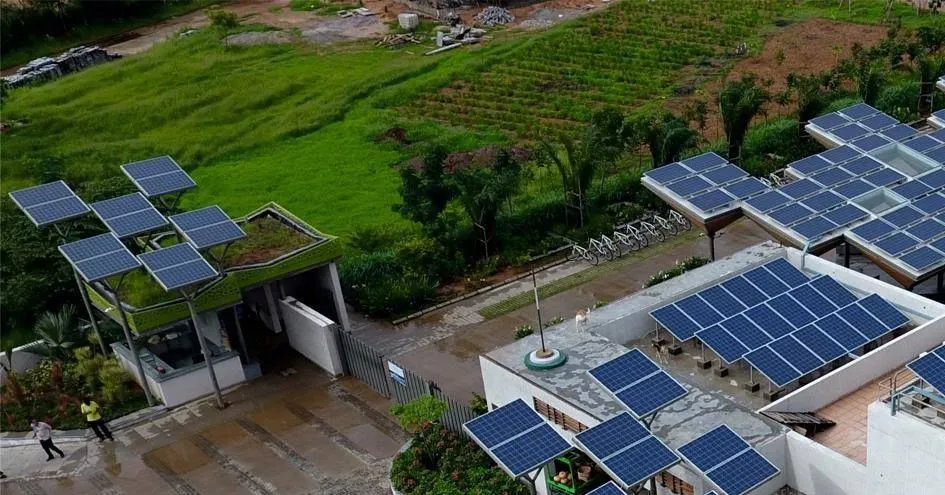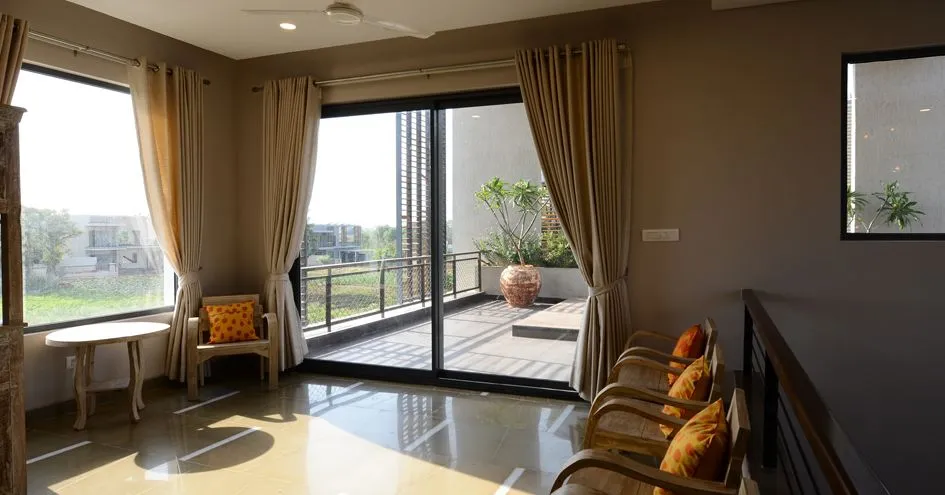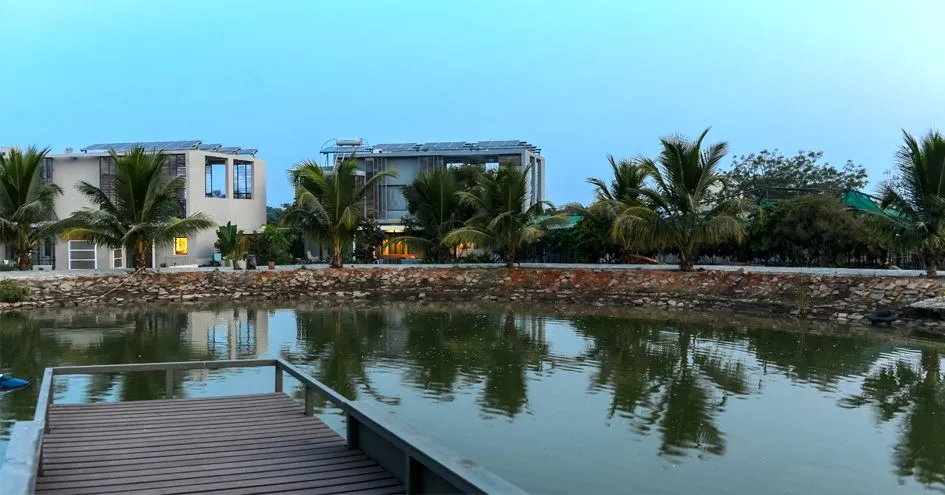 Contact us
Contact usIntent
Community
Studio Organo Concepts
About Us
Subsidaries
Studio Organo
TS RERA No.P02400003403.
TS RERA No.P02400003403.

Humans, since the dawn of time, have organised themselves into communities and lived happily off the land around them. It was not until the Industrial Revolution began in Britain in the 1700s that people began moving away from their villages for work. Although slowly coming into effect in India by the mid-1800s, Asian countries had largely remained unaffected by industrialisation in the way the West had.
Even today an incredible 66% of India lives rurally, versus 29%, 19%, and 21% of Australians, North Americans, and British people respectively. Even China – whose move towards urbanisation began long after India – only have an estimated 40% of their population still living rurally. Indians have a persistent relationship with village life that is (il)logically disproportionate to its development, and that is something to recognise.
That considering the pace of modernisation here, and the speed at which development has occurred; with practically every multi-national corporation setting up shop to the vast and impressive expansion of all major metropolises – it really is quite the mean feat that Indians are still so so in love with their countryside and prefer, en masse, living amongst it.
It should not then surprise us to know that today, at the height of luxurious living, city-goers are slowly but surely showing interest in going back to their roots, and that spark of demand is what is making projects like Organo a reality.
Living in cities gave people a taste for all things global – after all these had now become melting pots for communities from not only around the country but also of people from all ends of the world. No doubt there have been benefits to making the world a smaller place.
Learning from and about other cultures and communities has never been a bad thing, but somewhere in it we perhaps started to also lose part of the essence of what it is to be truly ‘Indian’. Restaurants sprung up dishing up delicious cuisines from all four corners of the world, and so with it our tastes expanded.
Soon we would be easily able to buy produce flown in from countries all around the world at our local shops, all to meet our evolving tastes. How easy was it to forget about seasonality whilst we enjoyed succulent strawberries in December, surely not a crime?

The economy being liberalised in the onset of the 90s was when India began to see people moving in their droves from villages to work in the fast-emerging private sector. Naturally, that created the demand for new housing in the cities.
As with all city stories, space is precious, and we have become accustomed to living in small quarters that increasing sacrificed outdoor space. We no longer had the time, space, or capacity to grow our own vegetables, let alone raise our own animals.
Mass agriculture soon boomed to keep up with the demand of the ever-swelling cities, and supermarkets sprung up to provide us with all the things we couldn’t produce for ourselves - at any time of day or night; season or weather.
We wanted everything done like yesterday! We learnt how to make cows produce more milk, how to raise chickens that were meatier, and vegetables that were uniform in shape and colour.
It wasn’t long before this ultimate convenience became a habit.
Why wouldn’t it?
Regardless, this was quite simply the route by which we brought prosperity into our homes. It was a well-placed intention; people of that generation were sent by their parents from the villages to earn money and send it back to their rural homes. It is human nature to succeed, and with the promise of increased wealth people naturally moved to the cities.
At the time, environmental impact would not have been considered. It has only truly been by watching with our own eyes what decades of urbanisation has done to our planet and lifestyle, with the help of greater freedom of information, that the damage has become so apparent.
As Indians increased in said prosperity through the economic boom, we travelled and soaked in the delights of the world.
We studied abroad and fancied the cultures we visited much so that we opened businesses here to provide us with those same luxuries and conveniences at home. Fast food; fast fashion; fast cars – all things we revelled in and stopped at nothing to provide for ourselves.
Little thought had been given towards the environmental impact of such living. When we ordered a pizza on our phones, did we wonder about the welfare of the cows from which the cheese came from?

When we went to the malls to buy branded t-shirts for our children, did we think upon whether the cotton was sustainably-sourced and whether the labourers stitching them were fairly paid?
When we zoomed up the street in a shiny gas-guzzling German car, did we think of the environmental impact whilst stepping on the accelerator? We are all guilty of it. We seeing it now, and are creating solutions to remedy the damage that we have done, whilst attempting to live in greater harmony with our surroundings and bodies.
No doubt a turning point occurred with the coming of the social media age, which went on to have an enormous impact on what we now know about anything, be it Rumi quotes, cricket scores, biryani recipes or the levels of pollution on that particular day in your very city – any information became available to anyone at the click of a button.
Humans can be forgiven for acting in ignorance, but as an intellectual species we generally find it difficult to ignore compelling information that is put before us. Social media as a medium has helped us to understand things about this planet that would never have been brought to our attention through conventional media.
The power players in the retail, oil and agriculture industries (to name a few sectors) have largely kept us out of the loop as to the environmental impact of what wares they sell – it would not make business sense either to share it.

Fortunately though, through this rise of digital information sharing, independent activists having a public space to speak, large-scale campaigning and the improved ability to measure the true impact of our existence, an urban-living individual would have to be living under a rock to not hear about how consumerism and globalisation has affected the well-being of our planet.
Coupled with this is the influencing effect that social media has had on big corporations by pressurizing them to move towards ‘greener’ solutions. Now it has become a selling point in itself for a business or product to be seen as green. Whether this is a genuine concern for a big business is another question, but for now the consumer has begun to demand it and corporations are beginning to deliver.
Since around2005 in particular, an interesting paradigm shift began in India and continues today – the trend for people moving to the cities has been slowing year on year(World Bank Figures), whilst the trend for purchasing land in rural areas is increasing, with an estimated 300% increase in sales of farmhouses in certain regions during the past year.
Indeed since the beginning of the pandemic, mindsets towards work and living have changed drastically. With offices remaining shut and working from home subsequently becoming the new normal, needing a base from which one can easily commute to the workplace has become increasingly insignificant.

Massive organisations the world over are quickly reducing the office spaces they inhabit opting, rather, for the better facilitation of working remotely.
This has undoubtedly benefited the corporations firstly in that their fixed costs have gone down, but more interestingly it has taught us all that we have been just as, if not more, productive working remotely, as well as being more emotionally present and invested in our home spaces. ‘Home’ is no longer solely where you rest your head; it is now where one works, eats, sleeps and plays, etc.
Naturally, with us spending more time in the home environment (albeit initially not through choice) we have begun to organise these spaces in a way that are more conducive to what a human being truly needs to survive in their habitat. It soon became apparent that fancy restaurants and going to an art gallery weren’t the things we were missing. We began cooking for ourselves and enjoying it.

We started baking our own breads and finding they tasted better. Lockdowns the world over have made people realise that we do not actually need the things we had once considered as basic requirements. Working from home; cooking in our own kitchens; using what was readily available; living without home help; spending our leisure time at home or in the outdoors rather than in cinemas, malls and resorts - people began to live in this new normal, and began seeing great merit in it.
As our home surroundings have suddenly became more integral to our lives, so we have begun to question what truly suits us better as responsible inhabitants of this planet. It is in this light that eco-habitats are becoming ever more popular, and what would have seemed to be an ‘off the beaten track’ lifestyle has become more normalised. All those luxury outings and holidays have been off the cards during the large part of the past year.
Now instead people have started to question where their food originates from; where their milk comes from; how clean the air they breathe is.
Humans are inherently a rural-living species, and so it is not difficult to connect with the idea of returning to those roots. Village living – what was not long ago thought of as a ‘backwards’ or ‘traditional’ way of life – is quickly becoming the advanced way to live. Even in many city apartments now across India, residents are encouraged to compost waste and recycle, for example. Even for people not ready to make such a swift departure from the urban life, it is easy to see many efforts city dwellers are making to be more conscious, whether that is in the greater demand for organic produce, or the millennials pioneering thrifting culture and so on, efforts are more noticeably being made.
Furthermore, using our advancements in technology and eco-conscious thinking has, in fact, made us think in a very modern way about living away from cities. It no longer needs to be that place that doesn’t always get electricity. The modern eco-habitat will use solar panels for the generation of electricity. It will build homes with inbuilt systems of either ventilation or insulation so save on inefficient cooling/heating systems. This latest generation of eco-habitors have blended back to basics living with the clever use of engineering and technology seamlessly.

Organo has been a pioneer in eco-habitats in India, being the first living space of its kind on the subcontinent. Its success lies in the way it allows people to live the most planet-friendly existence, without having the intensity of moving back to an ancestral village.
The development allows for people to have their own home with farms in Hyderabad away from the city and to be able to benefit from the things that come with that, without the expectation of having to do work that perhaps now – having lived so long in the city – we genuinely have no idea how to do.
Farming crops, milking cows, and the like; things that people have begun to understand that they’d like to benefit from, yet wouldn’t have the faintest idea of how to do themselves. Therefore, this kind of community employs people from surrounding villages as farmers and so on, in turn passing on knowledge to them about new ways of farming without pesticides for example.
Agriculture in India over the past few decades has made local farmers reliant on pesticides to secure sales and meet fast-paced market demands. Working in farms in Organo is changing that culture entirely and bringing us back to the way we are meant to grow and eat our food; the way we have been farming and eating for all those centuries before.
Living, too, in a community of like-minded individuals nurtures and encourages people to embody the ‘Sapthapatha’ system through which we see a clear route to a sustainable future. That is that food, water, air, earth, energy, shelter and community are all intrinsically linked and must be employed in the correct way to promote better wellbeing for ourselves and the planet, so that we can reclaim our ‘heaven on earth.
